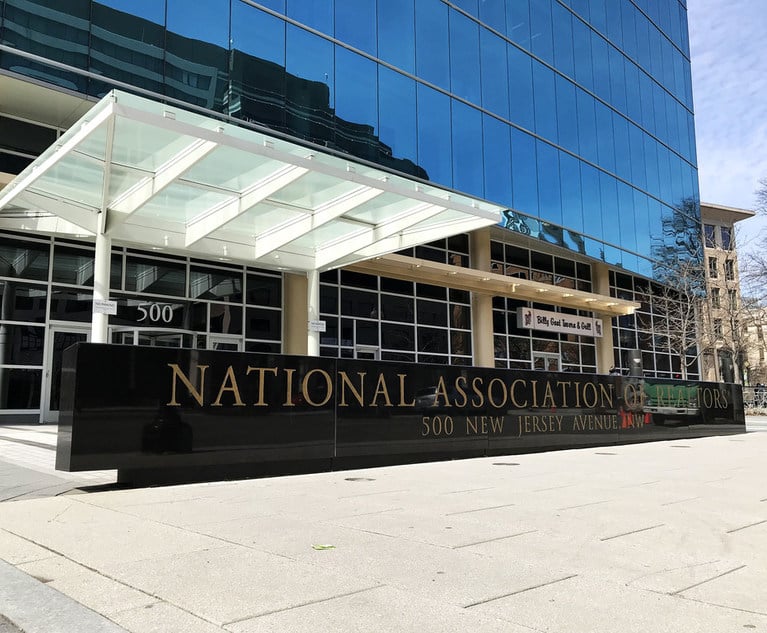Ohio National Fights to Avoid Arbitration as Commission Lawsuits Pile Up
Ohio National has thus far failed to keep the pending litigation out of arbitration.
August 01, 2019 at 12:39 PM
8 minute read

Ohio National Life Insurance has suffered a series of legal setbacks as it fights lawsuits and arbitration demands in the wake of last year’s decision to stop paying certain commissions to thousands of brokers selling variable annuities.
A new lawsuit was filed against Ohio National in Texas in July, the company is resisting arbitration demands in Ohio, and its lawyers are asking a Massachusetts judge to reverse a ruling routing a case into FINRA arbitration.
In the company’s home state of Ohio, it suffered a key setback after Magistrate Judge Stephanie Bowman’s issued a recommendation June 28 that found there was sufficient evidence to allow the claims for breach of contract and unjust enrichment to proceed. Ohio National unsuccessfully argued that the plaintiff—a representative for a broker-dealer marketing the annuities—lacked standing as a third party to the selling agreement.
“That was a very significant development that allows the case to move forward on behalf of the representatives selling the product,” said an attorney in that case, Dennis Concilla of Columbus, Ohio’s Carlile Patchen & Murphy. “Ohio National had asked the court to rule that they were not a party to the contract, and therefore had no right to sue.”
Ohio National is now arguing that if Bowman’s recommendation stands, it will “open the floodgates to litigation initiated by corporate employees/agents on all sorts of corporate contracts.”
Judge Susan Dlott, who is overseeing that case and two others consolidated before her, has not yet ruled on whether she’ll accept Bowman’s assessment.
Concilla’s complaint does not seek to have the dispute sent to a FINRA arbitration panel, which Ohio National has been fighting tooth and nail, but Concilla said he understands why the insurer and its co-defendant affiliates may want to stay in federal court.
“This is just speculation, but a FINRA arbitration is a court of equity and I suspect they feel that they could lose in that kind of setting,” Concilla said. “A court responds to law and fact; an arbitration panel rarely rules on a motion to dismiss, for example.”
Ohio National’s lead counsel is Marion Little and Christopher Hogan of Columbus’ Zeiger, Tigges & Little. They did not respond to a request for comment, and an Ohio National spokeswoman said the company will not comment on the pending litigation.
The litigation centers on Ohio National’s decision last year to get out of the annuities business altogether to focus on its life and disability insurance products. Among the annuities it discontinued were those with a provision called the Guaranteed Minimum Income Benefit Rider, which guaranteed a certain level of income to the purchaser regardless of underlying performance of the investments.
According to court filings, Ohio National and its subsidiaries sold more than $10 billion in variable annuities between 2012 and 2018, paying commissions to some 50,000 to 75,000 advisers affiliated with independent broker-dealers who opted to receive smaller up-front commissions in favor of larger trail commissions, or ongoing commissions paid for the products they sell.
The insurer sent termination letters to broker-dealers selling the GMIB annuities, saying in September that it was canceling their contracts and would no longer pay trail commissions.
Lawsuits accused Ohio National and its subsidiaries of breaching their selling agreements, which said the commissions would be paid until the annuities were surrendered or paid out. The complaints said individual brokers and representatives stood to lose tens of thousands of dollars annually from the canceled commissions, and some named additional defendants including Ohio National Life Assurance Corp., Ohio National Equities Inc. and Ohio National Financial Services.
Ohio National’s responses all revolve around the argument that its contracts allowed termination with a 60 day prior notice, and that the commissions were only guaranteed to be paid while the contracts were valid.
The insurer is fighting to keep the disputes out of arbitration, arguing it is not a FINRA member and cannot be compelled to arbitrate without its consent.
Ohio National has sued several broker-dealers who are also seeking FINRA arbitration in Ohio.
And earlier this month a Texas-based broker-dealer filed a new complaint—the second in that state—joining other federal litigation including actions pending in California, Illinois, Minnesota and Alabama.
In its own Ohio lawsuit against several broker-dealers in California, Florida and Delaware, Ohio National said it received complaints filed with “multiple state departments of insurance” by customers saying their GMIB annuities were being terminated, that the insurer had “fired” their advisers, that the advisers will no longer have access to the customers’ financial information, and will no longer provide “financial advisory services that the customer paid for and will continue to pay for” in annual fees.
Those assertions are false, the insurer said, and were part of a campaign “orchestrated” by the defendants or their agents and constituted a breach of their contracts.
In addition, it said some of the defendants filed at least two complaints seeking FINRA arbitration, even though their contracts contained no arbitration clause.
In Massachusetts, where U.S. District Judge Denise Casper of the District of Massachusetts granted the plaintiff’s request to force a dispute into FINRA arbitration, the insurer has sought to have the case reopened so the ruling can be submitted to an interlocutory appeal.
Ohio National used similar arguments before Casper, who granted the plaintiff’s request to force a dispute into FINRA arbitration in Massachusetts. While FINRA rules do provide that arbitration cannot be compelled against a non-member, the selling agreement for the annuities contained a “valid, enforceable arbitration agreement between the parties, not just those entities already bound to FINRA arbitration” under those rules, Casper wrote. “While defendants assert the opposite, they cite no law or fact that would render the contracts invalid under traditional principles of law or equity.”
Ohio National wants the case to be reopened and certified for an appeal, arguing that case law addressing the issue of forcing a non-FINRA party into arbitration has not been “settled” as “neither the First Circuit nor the U.S. Supreme Court has ruled on this issue.”
Ohio National’s lawyers conceded in a July 17 brief that courts have routinely held that arbitration agreements encompass the “obligation to arbitrate disputes with the entity’s agents who are claimed to have personal liability.”
“But that is not this type of case,” it said. “Instead, this case involves an agent of a contracting party [Commonwealth Equity Services representative Margaret Benison] seeking to arbitrate against another party to the contract.”
“Benison cannot compel [Ohio National Life Insurance Company and Ohio National Life Assurance Company] to arbitrate because FINRA rules incorporated into the contract do not allow it,” the brief said, and “cannot use the contract to fabricate a right to arbitrate” that those rules prohibit.
Casper has not yet ruled on the motion.
Ohio National is not the only entity leery of FINRA involvement.
When it discontinued the trail commissions, the insurer followed up by sending the broker-dealers whose contracts they were canceling new “servicing agreements” under which they would still be paid for servicing their clients’ non-GMIB annuities.
But the broker-dealers would not be paid for servicing the discontinued annuities, even though they “are expected to service the GMIB Annuities, and incur the obligations that come with same, without payment or receipt of any compensation,” according to the complaint in Commonwealth Equity.
That has some broker-dealers worried they may run afoul of FINRA rules.
“My big problem is that they’re saying they’ve terminated their selling agreements with all these firms, and most of the firms haven’t signed a new service agreement,” said a broker-dealer who asked not be identified because he is involved in the litigation.
“Ohio National is still acting as if there is an active agreement between them and the broker-dealers,” he said. “But if Ohio National’s position is that they’ve terminated their selling agreements but they’re still allowing the representatives to service the products, they’re sharing customer information with a disinterested party. That’s in violation of a number of FINRA rules.”
Ohio National’s move also created an impermissible conflict, he said, because representatives forced to work for free have no incentive to provide the service or advice their clients need to make decisions about complicated financial products like annuities, he said.
“Ohio National needs to take all of this on,” he said. “You can’t tell me I’m fired and you’re not going to pay me, but I still have to come to work. If we’re terminated you need to take over servicing these tens of thousands of contracts.”
A FINRA spokeswoman said as a policy, the agency does not comment on or confirm whether any enforcement actions have been initiated or whether arbitration complaints have been lodged.
This content has been archived. It is available through our partners, LexisNexis® and Bloomberg Law.
To view this content, please continue to their sites.
Not a Lexis Subscriber?
Subscribe Now
Not a Bloomberg Law Subscriber?
Subscribe Now
NOT FOR REPRINT
© 2024 ALM Global, LLC, All Rights Reserved. Request academic re-use from www.copyright.com. All other uses, submit a request to [email protected]. For more information visit Asset & Logo Licensing.
You Might Like
View All
California DOJ Fines Robinhood $3.9M in First-Ever Crypto Enforcement Action

FINRA Hires Senior JPMorgan Chase Attorney to Lead Beefed-Up Enforcement Team

Financial Firms Hindering Growth by Keeping In-House Lawyers Out of Strategy Meetings, Study Finds
3 minute read
National Association of Realtors Reaches $418M Settlement to Resolve Antitrust Class Actions
Trending Stories
- 1Infant Formula Judge Sanctions Kirkland's Jim Hurst: 'Overtly Crossed the Lines'
- 2Trump's Return to the White House: The Legal Industry Reacts
- 3Election 2024: Nationwide Judicial Races and Ballot Measures to Watch
- 4Climate Disputes, International Arbitration, and State Court Limitations for Global Issues
- 5Judicial Face-Off: Navigating the Ethical and Efficient Use of AI in Legal Practice [CLE Pending]
- 6How Much Does the Frequency of Retirement Withdrawals Matter?
Who Got The Work
Michael G. Bongiorno, Andrew Scott Dulberg and Elizabeth E. Driscoll from Wilmer Cutler Pickering Hale and Dorr have stepped in to represent Symbotic Inc., an A.I.-enabled technology platform that focuses on increasing supply chain efficiency, and other defendants in a pending shareholder derivative lawsuit. The case, filed Oct. 2 in Massachusetts District Court by the Brown Law Firm on behalf of Stephen Austen, accuses certain officers and directors of misleading investors in regard to Symbotic's potential for margin growth by failing to disclose that the company was not equipped to timely deploy its systems or manage expenses through project delays. The case, assigned to U.S. District Judge Nathaniel M. Gorton, is 1:24-cv-12522, Austen v. Cohen et al.
Who Got The Work
Edmund Polubinski and Marie Killmond of Davis Polk & Wardwell have entered appearances for data platform software development company MongoDB and other defendants in a pending shareholder derivative lawsuit. The action, filed Oct. 7 in New York Southern District Court by the Brown Law Firm, accuses the company's directors and/or officers of falsely expressing confidence in the company’s restructuring of its sales incentive plan and downplaying the severity of decreases in its upfront commitments. The case is 1:24-cv-07594, Roy v. Ittycheria et al.
Who Got The Work
Amy O. Bruchs and Kurt F. Ellison of Michael Best & Friedrich have entered appearances for Epic Systems Corp. in a pending employment discrimination lawsuit. The suit was filed Sept. 7 in Wisconsin Western District Court by Levine Eisberner LLC and Siri & Glimstad on behalf of a project manager who claims that he was wrongfully terminated after applying for a religious exemption to the defendant's COVID-19 vaccine mandate. The case, assigned to U.S. Magistrate Judge Anita Marie Boor, is 3:24-cv-00630, Secker, Nathan v. Epic Systems Corporation.
Who Got The Work
David X. Sullivan, Thomas J. Finn and Gregory A. Hall from McCarter & English have entered appearances for Sunrun Installation Services in a pending civil rights lawsuit. The complaint was filed Sept. 4 in Connecticut District Court by attorney Robert M. Berke on behalf of former employee George Edward Steins, who was arrested and charged with employing an unregistered home improvement salesperson. The complaint alleges that had Sunrun informed the Connecticut Department of Consumer Protection that the plaintiff's employment had ended in 2017 and that he no longer held Sunrun's home improvement contractor license, he would not have been hit with charges, which were dismissed in May 2024. The case, assigned to U.S. District Judge Jeffrey A. Meyer, is 3:24-cv-01423, Steins v. Sunrun, Inc. et al.
Who Got The Work
Greenberg Traurig shareholder Joshua L. Raskin has entered an appearance for boohoo.com UK Ltd. in a pending patent infringement lawsuit. The suit, filed Sept. 3 in Texas Eastern District Court by Rozier Hardt McDonough on behalf of Alto Dynamics, asserts five patents related to an online shopping platform. The case, assigned to U.S. District Judge Rodney Gilstrap, is 2:24-cv-00719, Alto Dynamics, LLC v. boohoo.com UK Limited.
Featured Firms
Law Offices of Gary Martin Hays & Associates, P.C.
(470) 294-1674
Law Offices of Mark E. Salomone
(857) 444-6468
Smith & Hassler
(713) 739-1250








